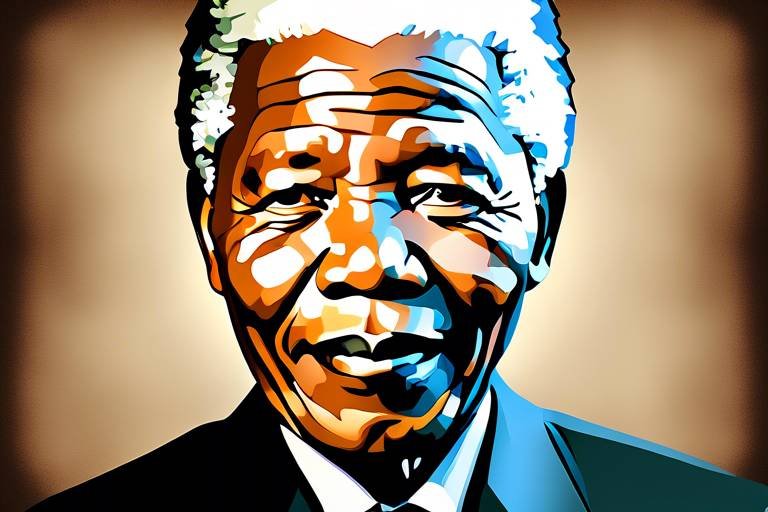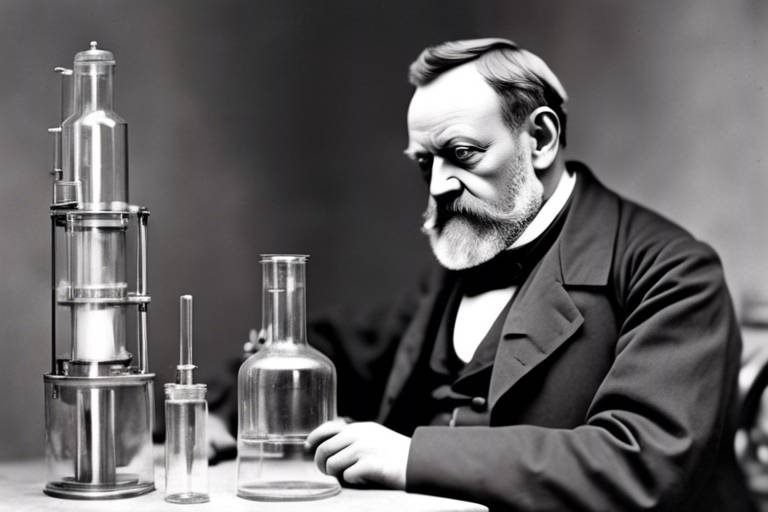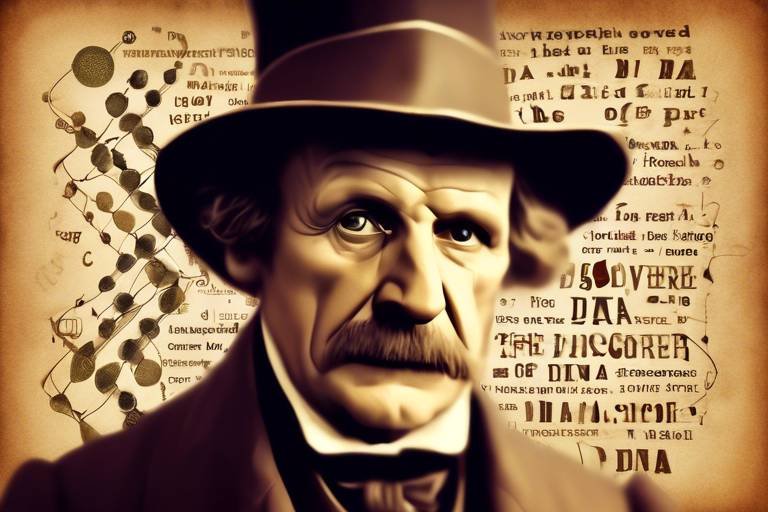Huxley: The Philosopher of Science
Thomas Henry Huxley, known as "Darwin's Bulldog," was a prominent figure in the 19th-century scientific community. His contributions to evolutionary biology and his philosophical insights have left a lasting impact on the fields of science and ethics. Let's delve into the life and work of this influential thinker.
Thomas Huxley was born in Ealing, England, in 1825. Raised in a working-class family, he showed a keen interest in natural history from a young age. Despite facing financial challenges, Huxley pursued his education with determination, eventually becoming a self-taught expert in various scientific disciplines.
Huxley's most significant contribution to science lies in his defense and popularization of Charles Darwin's theory of evolution. Through his research and writings, Huxley played a crucial role in advancing the acceptance of evolutionary biology as a legitimate scientific field.
Delving into the realm of human nature and ethics, Huxley believed in the importance of applying scientific principles to understand moral dilemmas and societal issues. He argued for a rational, evidence-based approach to ethical decision-making, emphasizing the need for critical thinking and empirical evidence.
Huxley's views often clashed with religious authorities, particularly on matters of creationism and the role of science in shaping our understanding of the natural world. His debates with theologians sparked discussions on the compatibility of faith and reason, leading to the advocacy for the independence of scientific inquiry from theological dogma.
Embracing the scientific method as a cornerstone of his work, Huxley championed empiricism and the rigorous examination of evidence in scientific investigations. He emphasized the importance of skepticism and critical analysis in forming scientific theories, paving the way for modern scientific methodology.
As a proponent of secularism and agnosticism, Huxley advocated for the separation of church and state, promoting a society where scientific inquiry and rational thought prevail over religious dogma. His efforts in advancing secular values have had a lasting impact on the cultural landscape of modern societies.
Huxley's legacy endures through his profound influence on the philosophy of science, education, and public discourse. His commitment to evidence-based reasoning and intellectual honesty continues to inspire generations of scientists and thinkers, shaping our understanding of the natural world.
Even in the 21st century, Huxley's ideas remain relevant in discussions on science, ethics, and the pursuit of knowledge. His emphasis on critical thinking, empirical evidence, and the pursuit of truth serves as a guiding light in navigating the complexities of modern scientific and ethical dilemmas.
1. What was Thomas Huxley's nickname and why?
- Answer: Thomas Huxley was known as "Darwin's Bulldog" due to his fierce advocacy and defense of Charles Darwin's theory of evolution.
2. How did Huxley's views on science and theology influence society?
- Answer: Huxley's debates with religious authorities and advocacy for the separation of science and theology sparked discussions on the role of empirical evidence in shaping our understanding of the natural world, leading to a more secular and rational approach to societal beliefs.

Early Life and Education
Thomas Henry Huxley, also known as "Darwin's Bulldog," was a prominent figure in the 19th-century scientific community. His work not only revolutionized the field of evolutionary biology but also had a profound impact on the intersection of science, ethics, and society.
Thomas Huxley was born in Ealing, England, in 1825. Coming from a modest background, he faced financial challenges that shaped his early life. Despite these obstacles, Huxley's passion for learning led him to pursue a career in science. His education at Charing Cross Hospital Medical School laid the foundation for his future contributions to the scientific community.

Evolutionary Biology Contributions
Charles Huxley made significant contributions to the field of evolutionary biology, leaving a lasting impact on the scientific community. One of his most notable achievements was his role in popularizing Charles Darwin's theory of evolution through his extensive writings and public lectures. Huxley played a crucial part in advancing the acceptance of evolution as a fundamental concept in biology, challenging traditional beliefs and paving the way for modern evolutionary thought.

Human Nature and Ethics
Human nature and ethics were central themes in Huxley's philosophical inquiries, delving into the complexities of morality and the essence of humanity. He pondered deeply on the ethical implications of scientific advancements and the responsibilities that came with understanding human nature through a scientific lens. Huxley believed that a deep understanding of human nature could guide ethical decision-making, emphasizing the importance of empathy, compassion, and rationality in navigating moral dilemmas.
Furthermore, Huxley explored the intricate relationship between science and ethics, advocating for a harmonious coexistence where scientific progress enhances ethical considerations rather than diminishing them. He argued that a profound understanding of human nature could lead to a more ethical society, where individuals are guided by reason and compassion rather than blind adherence to dogma or tradition.
In his philosophical writings, Huxley challenged conventional notions of morality and ethics, urging individuals to question the foundations of their beliefs and actions. He believed that a critical examination of human nature could lead to a more enlightened ethical framework, one that is rooted in reason, empathy, and a deep appreciation for the complexities of human existence.

Conflict with Theology
Thomas Henry Huxley, famously known as "Darwin's Bulldog," was a staunch advocate for the separation of science and theology during the 19th century. His conflicts with theological authorities stemmed from his unwavering support for Charles Darwin's theory of evolution through natural selection. Huxley's debates with religious figures, most notably Bishop Samuel Wilberforce, at the Oxford evolution debate in 1860, highlighted the clash between scientific evidence and religious doctrine.
Throughout his career, Huxley championed the idea that scientific inquiry should be based on empirical evidence and rational thinking rather than religious dogma. He firmly believed in the supremacy of reason and the scientific method in understanding the natural world. This stance often put him at odds with religious institutions that viewed scientific discoveries as a threat to their beliefs.
Huxley's confrontations with theology were not merely intellectual debates but reflections of a broader societal shift towards secularism and the questioning of traditional religious authority. His advocacy for the autonomy of science from religious interference paved the way for a more rational and evidence-based approach to understanding the complexities of the universe.
Despite the controversies and criticisms he faced from religious circles, Huxley remained steadfast in his defense of scientific principles and the pursuit of knowledge through empirical observation. His legacy as a fierce proponent of scientific rationalism continues to inspire modern thinkers to uphold the integrity of scientific inquiry free from the constraints of religious dogmatism.

Scientific Methodology
Thomas Henry Huxley, also known as "Darwin's Bulldog," was a prominent figure in the 19th-century scientific community, renowned for his contributions to evolutionary biology and his outspoken advocacy for scientific inquiry and evidence-based reasoning. In this article, we delve into the life and work of Huxley, exploring his philosophical views on science, ethics, and the intersection of knowledge with society.
At the core of Huxley's philosophical framework lay a deep commitment to the scientific method as the most reliable tool for understanding the natural world. He believed that empirical evidence and rigorous experimentation were essential components of scientific inquiry, emphasizing the importance of observation and data analysis in forming sound conclusions.
Huxley's approach to scientific methodology was rooted in skepticism towards dogma and unsubstantiated claims, advocating for a methodical and logical approach to knowledge acquisition. He valued critical thinking and rationality, encouraging fellow scientists to question assumptions and seek verifiable evidence to support their theories.
Moreover, Huxley emphasized the role of peer review and collaboration in the scientific process, recognizing the value of constructive criticism and intellectual exchange in refining scientific theories. He promoted a culture of openness and transparency in scientific research, believing that sharing knowledge and engaging in healthy debate were essential for intellectual progress.
In his pursuit of scientific truth, Huxley championed the principles of objectivity and impartiality, urging scientists to remain unbiased and objective in their investigations. He believed that personal beliefs and prejudices should not influence the interpretation of data, advocating for a dispassionate and systematic approach to scientific inquiry.
- What was Huxley's role in popularizing Darwin's theory of evolution?
- How did Huxley view the relationship between science and ethics?
- What impact did Huxley have on the philosophy of science?
Huxley played a pivotal role in promoting and defending Darwin's theory of evolution through his public lectures and writings. He engaged in debates with opponents of evolution, showcasing the scientific evidence supporting Darwin's ideas.
Huxley believed that science and ethics were intertwined, emphasizing the importance of using scientific knowledge to promote ethical behavior and societal progress. He argued that a deeper understanding of the natural world could inform moral decision-making and contribute to the betterment of humanity.
Huxley's advocacy for evidence-based reasoning and empirical methodology influenced generations of scientists and philosophers, shaping the way we approach scientific inquiry and knowledge acquisition. His emphasis on critical thinking and skepticism continues to resonate in contemporary discussions on science and society.

Secularism and Agnosticism
Secularism and agnosticism were central themes in Thomas Henry Huxley's philosophical discourse, challenging the prevailing religious dogma of his time. Huxley staunchly advocated for the separation of church and state, emphasizing the importance of rational inquiry and scientific evidence over blind faith. His promotion of secularism aimed to create a society where decisions were based on reason and empirical observation rather than religious doctrine.
Furthermore, Huxley's agnosticism positioned him as a pioneer in questioning the nature of knowledge and the limits of human understanding. He famously coined the term "agnosticism" to describe his stance of skepticism towards claims of ultimate knowledge, asserting that certainty in matters beyond empirical evidence was unwarranted. This intellectual humility and commitment to evidence-based reasoning set the foundation for a more critical and open-minded approach to exploring the mysteries of existence.

Legacy and Influence
Thomas Henry Huxley, often referred to as "Darwin's Bulldog," left a profound legacy in the realm of science and philosophy. His tireless efforts to promote Darwin's theory of evolution and advocate for evidence-based reasoning have had a lasting influence on the scientific community and beyond.
Huxley's commitment to the principles of empirical observation and critical thinking shaped the way we approach scientific inquiry today. By emphasizing the importance of evidence and rationality, he paved the way for a more rigorous and disciplined scientific methodology that continues to guide researchers in various fields.
Moreover, Huxley's contributions to evolutionary biology have had a significant impact on our understanding of the natural world. His work in elucidating the mechanisms of evolution and defending the theory against religious opposition helped establish evolutionary biology as a cornerstone of modern science.
Beyond his scientific endeavors, Huxley's influence extended to the realms of ethics and education. His emphasis on the intersection of science with morality and social issues sparked discussions on the ethical implications of scientific advancements, prompting reflection on the responsibilities of scientists and society at large.
Furthermore, Huxley's advocacy for secularism and agnosticism as alternatives to religious dogma challenged prevailing societal beliefs and fostered a more open-minded approach to questions of faith and knowledge. His efforts to promote critical thinking and skepticism continue to resonate in contemporary debates on religion, science, and ethics.
In the field of education, Huxley's emphasis on the importance of scientific literacy and the public understanding of evolutionary theory has influenced curriculum development and science communication efforts. His commitment to disseminating knowledge and fostering intellectual curiosity has left a lasting imprint on educational practices worldwide.
Overall, Thomas Henry Huxley's legacy as a philosopher of science endures through his contributions to evolutionary biology, his advocacy for evidence-based reasoning, and his influence on ethical and educational discourse. His ideas continue to inspire critical thinking, scientific inquiry, and the pursuit of knowledge in a world shaped by rapid technological advancements and complex ethical dilemmas.

Contemporary Relevance
As we delve into the contemporary relevance of Thomas Henry Huxley, we uncover a tapestry of ideas that continue to shape our understanding of science, ethics, and knowledge in the modern world. Huxley's steadfast advocacy for evidence-based reasoning and empirical inquiry remains a guiding principle in scientific research today. His emphasis on the importance of critical thinking and skepticism in evaluating claims has become increasingly significant in an era inundated with misinformation and pseudoscience.
Furthermore, Huxley's promotion of secularism and agnosticism as rational alternatives to religious dogma continues to resonate with individuals navigating the complexities of belief systems and societal norms. In a world where the boundaries between science, religion, and ethics often blur, Huxley's call for intellectual independence and moral autonomy serves as a beacon for those seeking to navigate the intricate interplay of these domains.
Moreover, Huxley's insights into the nature of knowledge and the limitations of human understanding offer a poignant reminder of the humility required in the pursuit of truth. In an age characterized by rapid technological advancements and unprecedented access to information, Huxley's caution against dogmatism and unwavering certainty serves as a timely admonition to remain open-minded and receptive to new ideas.
Frequently Asked Questions
- What were Aldous Huxley's main contributions to evolutionary biology?
Aldous Huxley made significant contributions to evolutionary biology by popularizing Darwin's theory of evolution through his writings and lectures. He also played a key role in advancing the understanding of human evolution and the relationship between humans and other species.
- How did Aldous Huxley view the conflict between science and theology?
Huxley believed in the separation of science and theology, advocating for the autonomy of scientific inquiry from religious dogma. He engaged in debates with religious authorities to defend the importance of evidence-based reasoning and empirical research in understanding the natural world.
- What is the contemporary relevance of Aldous Huxley's ideas on secularism and agnosticism?
Huxley's promotion of secularism and agnosticism as alternatives to traditional religious beliefs continues to influence modern discussions on the role of faith in society. His emphasis on critical thinking and skepticism remains relevant in shaping ethical and moral frameworks in a diverse and evolving world.



















